Sennheiser’s flagship Bluetooth headphones focus more on lifestyle features than their sound.
- Excellent battery life
- Classy design, solid build
- Easy to use and reliable controls
- Good microphone performance
- Comfortable to wear for longer periods
- Sennheiser Smart Control app offers some useful features
- The sound is decent with EQ
- The stock sound signature has several tuning issues
- Below-average technicalities
- Controls cannot be customized
- Only 3-band EQ makes fixing the flawed tuning a challenge
Where to Buy
Introduction
Sennheiser’s wired headphones lineup is the stuff of legends. The likes of the HD650 or the more recent HD560S have earned glowing recommendations and enjoy sustained popularity.
On the flip side, their wireless headphones have had mostly mixed reception. The Momentum Wireless series has been in production for almost ten years now, and while they have always been a solid alternative, they have never set the bar.
Do the Momentum 4 Wireless change that trend, or are they merely the continuation of Sennheiser’s “almost there” wireless tendencies? Read on.
Packaging
Sennheiser opted for traditional cardboard packaging that does the job without looking flashy.
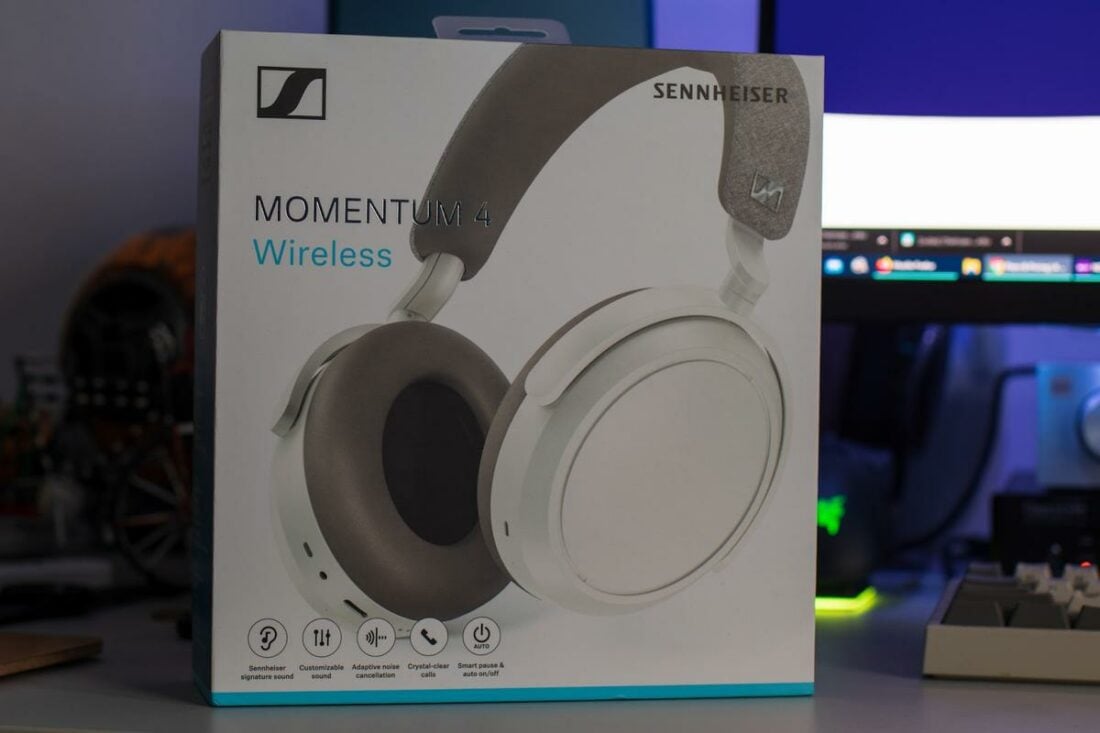
In the box
- Sennheiser Momentum 4 Wireless headphones
- 2.5mm to 3.5mm analog interconnect cable
- USB-C to USB-A charging cable
- Carrying case
- Airplane adapter
One thing I like about the carry case is the separate compartments for the supplied accessories. This way, you do not have to leave anything at home and can pack it all together.

The case has a fabric finish, similar to the case included with the Sony WH-1000XM5. The finish on the Momentum 4 case is better, though, with more robust construction.
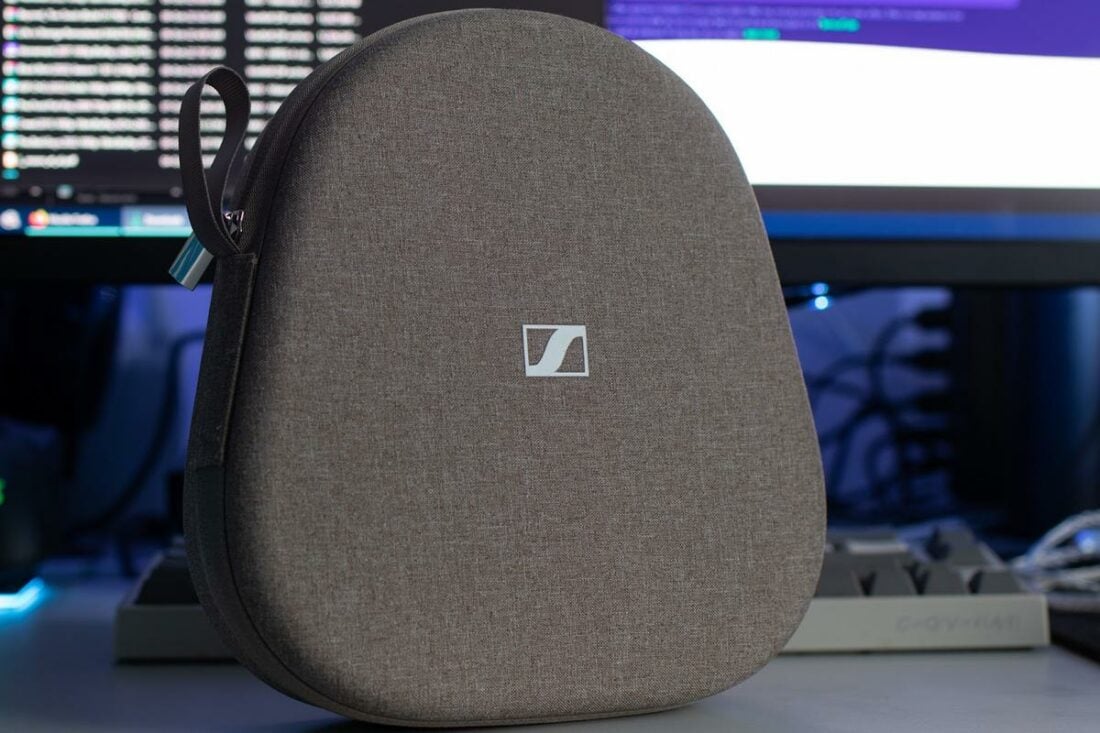
Battery ⓘ
- Battery Life: 60 hrs
- Charge Time (15 mins): up to 600 mins playback time
At around 60 hrs, the battery life of the Momentum 4 Wireless is excellent.
The standby battery drain is very low as well, resulting in high endurance even when not used for a while. If battery life is a priority, the Stax Spirit S3 are perhaps the only alternative, although they lack ANC and many lifestyle features.
The cherry on top: the quick charge function is as good as the competition, with 5 mins of charge providing up to 4 hours of playback. You need a suitable USB-PD adapter and cable for that to work, however.
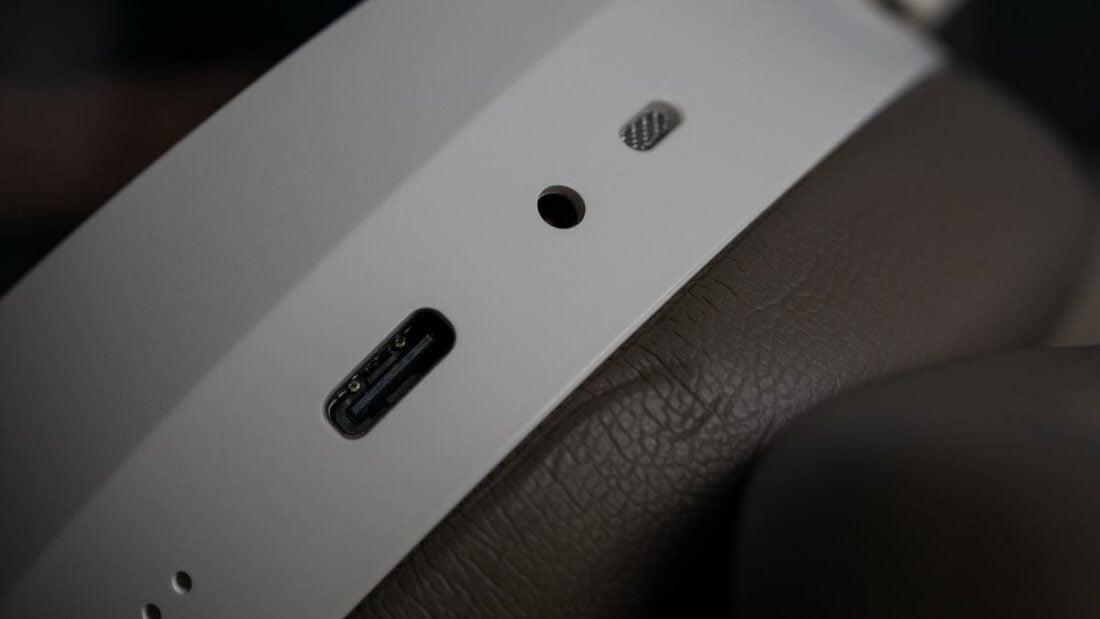
UX ⓘ
- Control Mechanism: Mechanical and touch
- Touch Accuracy: Very reliable
- Control Symmetry on both ear-cups: No
- Mono Use: No
- The right earcup hosts the mechanical button and touch surface.
Sennheiser opts for a hybrid of buttons and touch-based control systems. The good thing about this is that the controls are straightforward to use once you memorize them. The bad thing is the lack of flexibility, as you cannot re-assign any controls.
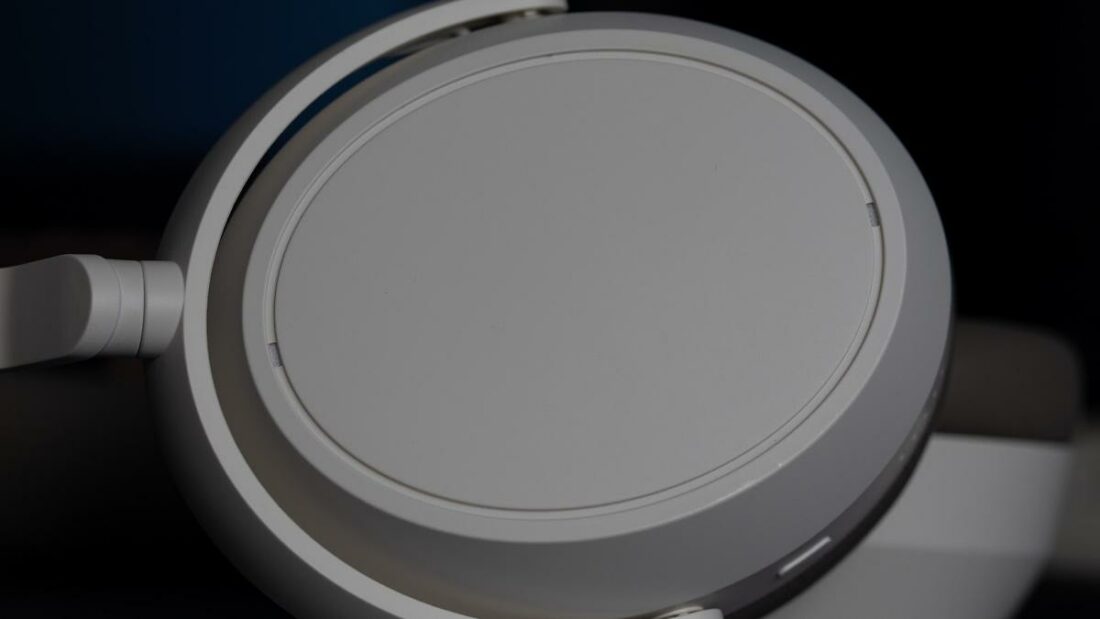
The solitary “multi-function button” on the right side can be used to turn the device on or off and put it in pairing mode by holding it for longer than 5 seconds.
A short rundown of the touch controls is as follows:
- Single tap: Plays and pauses music, answers or ends a call.
- Double tap: Cycles between ANC modes, accepts an incoming call, and puts the caller on hold during a call.
- Hold center for two seconds: Reject call.
- Swipe forward: Fast forward music and accept calls.
- Swipe backward: Skip to the previous track and end a call.
- Swipe up: Increases volume.
- Swipe down: Decreases volume.
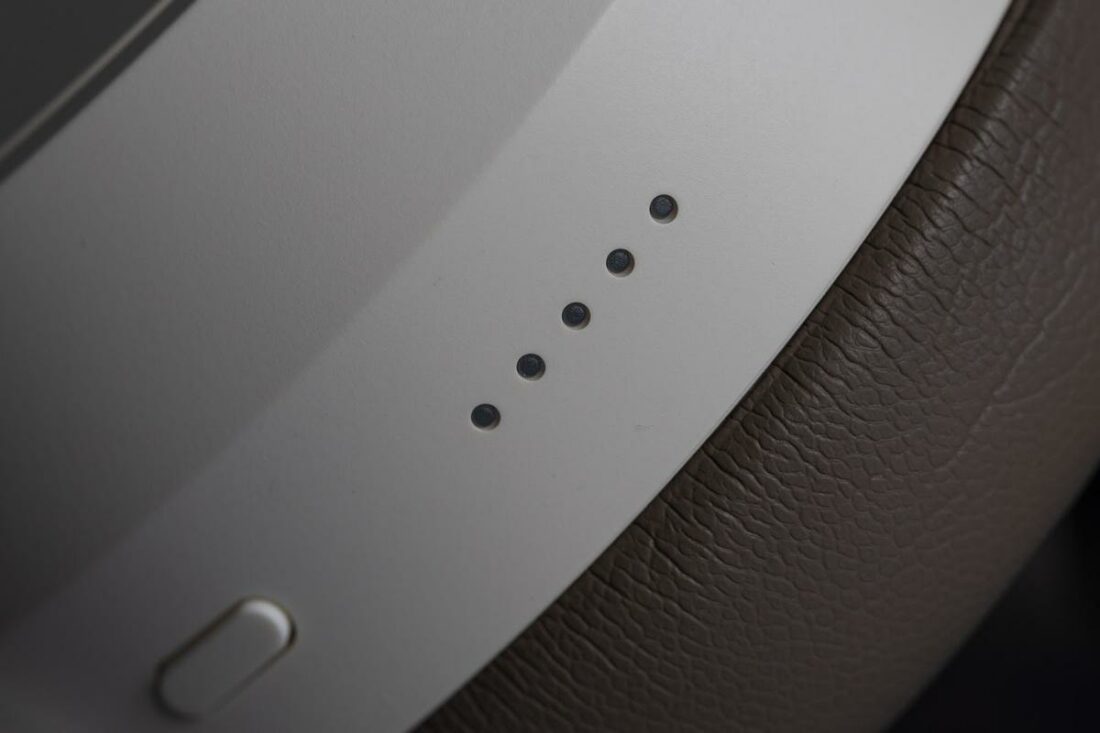
The left side is bereft of any controls or ports, although two of the four mics are located on this side. The left earcup can be identified by the raised nubs on the inner side of the left hinge.
The right earcup is very busy in comparison, housing the type-C port (with fast-charging support), activity LEDs, 2.5mm analog input, and the power/pair button. It also has the remaining two mics.
Design ⓘ
- Profile: Over-ear
- Material: ABS plastic
- Fit and Comfort: Good.
The all-plastic construction has two advantages: lightweight and RF transparency. The default earpad and headband are padded with pleather, with soft memory foam underneath. The headband has a fabric top that is premium to the touch.
There is no folding mechanism. The earcups rotate 90 degrees to face downwards to fit them in the case. The hinge mechanism is solid, albeit nothing extraordinary.
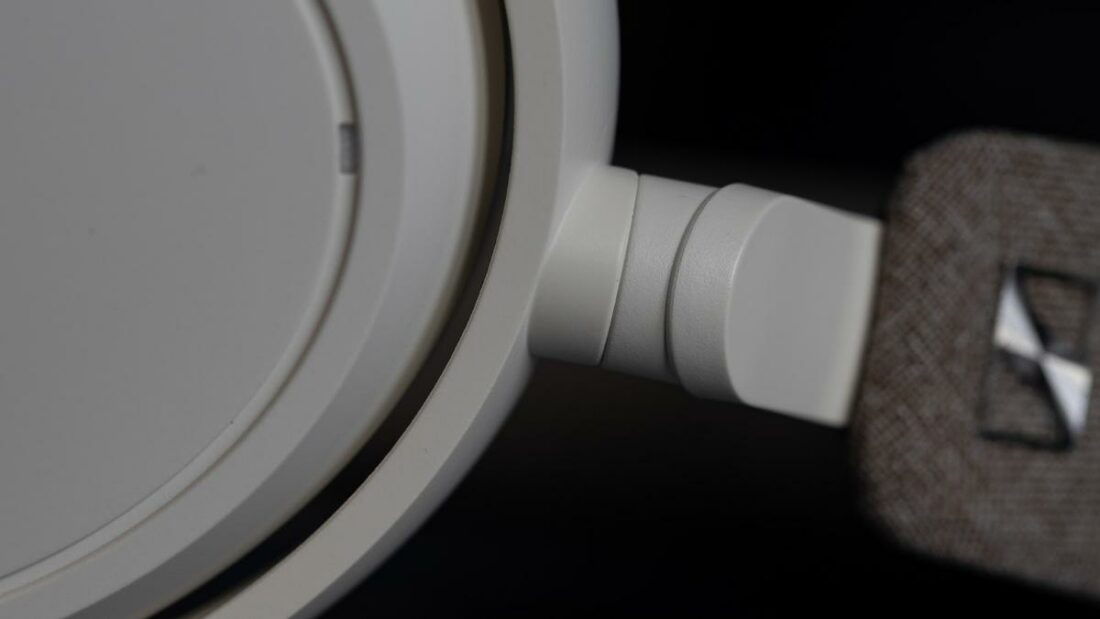
Adjustments can be made by sliding the earcups up or down. This is a stepless system, so you do not know the exact position of the earcups. I am not a fan of this design, but it has become common.
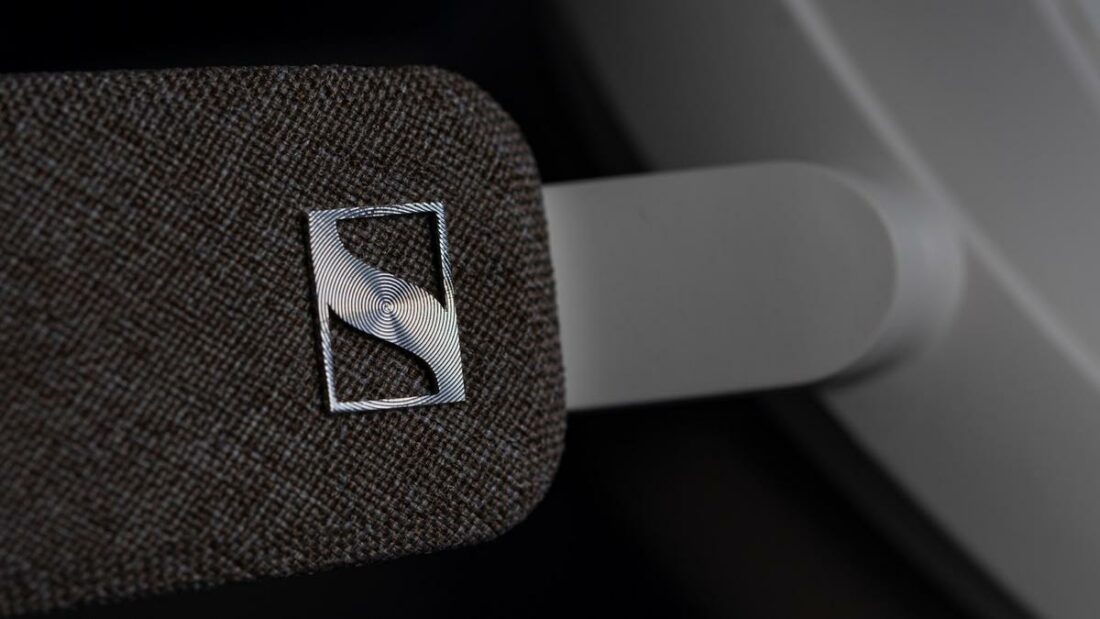
There is ample movement across the Y-axis to better seal against the user’s face. The clamping force is somewhat strong but does not cause discomfort during long sessions.
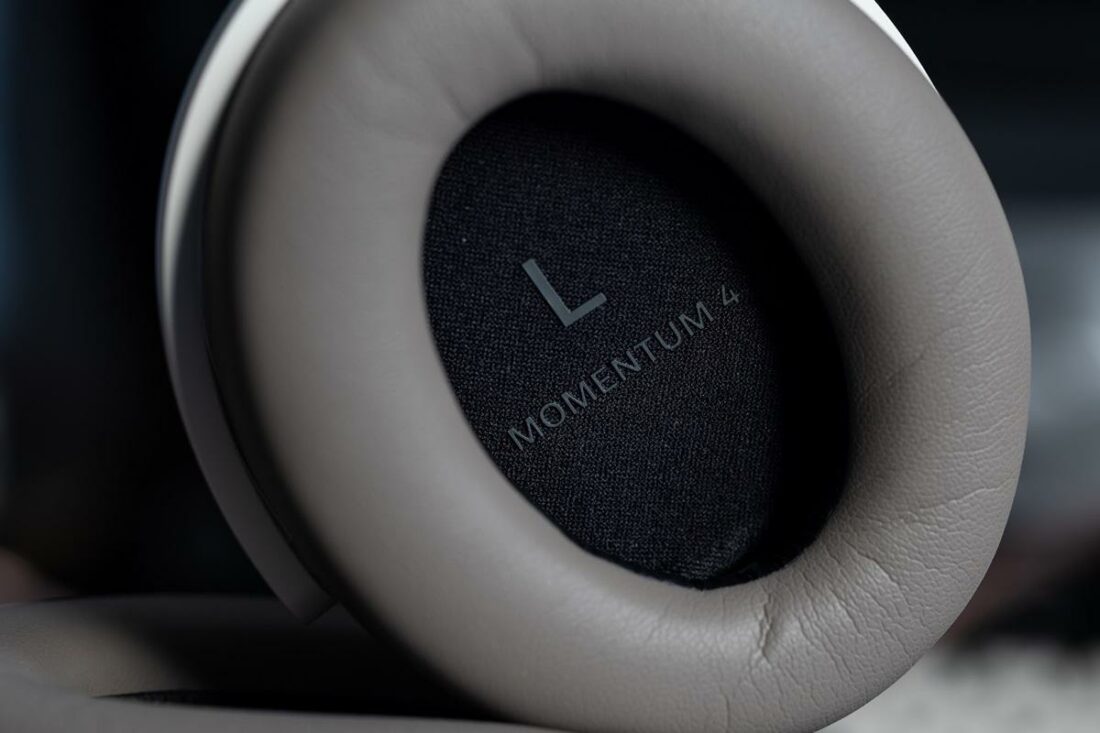
Mic ⓘ
- Noise Cancellation: Good
- Voice Pick-up: Good
There are four mics in total: two underneath each earcup for voice pickup, and two above the earcups to aid in noise cancellation. The sound pickup is excellent in quieter environments, while some crowd noise seeps in when on busy streets.

Mic demo
Sound ⓘ
- Driver: 42mm dynamic driver
- Sound Signature: Bass-boosted V-shape
- Bass: Average
- Mids: Average
- Treble: Average
- Soundstage: Average
- Imaging: Average
- Dynamics: Average
Unfortunately, the headphones sound utterly terrible in analog-only mode. Avoid this mode unless necessary.
The app has six presets: Rock, Pop, Classical, Dance, Hip-Hop, and Movie, plus a ‘neutral’ mode. I stuck with the default neutral preset as the other presets further botched the sound.
I also played a bit with the very limited 3-band equalizer. It manages to fix some midrange, bass, and treble issues. However, without fine-grained control, the tuning is beyond a complete fix.
Bass
Bass has a noticeable sub-bass emphasis, with the rise beginning from 350Hz. This adds impact to the sub-bass and introduces some mid-bass bleed. The bass lacks articulation, as fast-flowing bass sections lose their sense of dexterity.
Mids
The midrange has some strange peaks and dips. It peaks around 1kHz slightly, then dips a bit, then again picks up the pace from 1.6kHz onward and climbs straight up to 3kHz. Then, there is another peak around 3.6kHz
The strange tuning choices lead to a honky midrange that sounds subdued in tracks with higher-pitched vocals.
Male vocals sound husky, while female vocals fare better but still exhibit some hollowness. Strings have a sharpened leading edge to their notes, but the sense of hollowness never goes away.
Treble
Lower-treble peaks around 5kHz, but does not go overboard as the upper-mids remain in focus. Then another pair of peaks near 7kHz and 9kHz add some metallic sheen to cymbals and hi-hats. Finally, there is an upper-treble peak near 14kHz.
The mid-treble peaks make guitar riffs and the leading edge of acoustic guitars sound metallic, as is noticeable on the guitar strums of Damien Rice’s Canonball.
Cymbal hits have a “sizzled” undertone, as the lack of proper extension focuses too much on the initial hit of the cymbal and the ensuing resonance is muted abruptly. Cymbals sound thin and sharp as a result, often leading to fatigue in tracks such as As I Lay Dying’s Forever.
The general sound signature of the Sennheiser Momentum 4 Wireless is bassy V-shaped, with some noticeable unevenness in the mids and treble.
Dynamics
Macrodynamic punch is decent, with sudden bass drops having a noticeable “kick.” However, you do not get the guttural feeling that some headphones can provide. Orchestral pieces lack the sense of grandiosity during crescendos.
Microdynamics are not portrayed well, as subtle shifts in the volume are barely perceptible.
Soundstage
The Sennheiser Momentum 4 Wireless have a narrow soundstage in terms of stage width. Stage depth and height are also merely average, making this one of the weak aspects of these headphones.
Imaging
Spatial cues are also average, with good left and right delineation but poor ordinal imaging (top-left, bottom-right).
Active noise cancellation
Sennheiser offers three stages of “Active Noise Cancellation” on the Momentum 4 Wireless: full ANC, ANC off, and Transparency mode.
In general, the ANC works well, though human voices in the background appear somewhat strangely muted and offset from the center of the head. It’s a strange sensation that I have not heard elsewhere.
The filtering of high frequencies is another shortcoming of the ANC, which is not as good as the category leaders.
Nonetheless, Sennheiser’s implementation of ANC and transparency mode works well for the most part, especially their “Comfort Call” mode that allows you to hear your own voice.
Connectivity ⓘ
- Audio Codec: SBC, AAC, aptX Adaptive
- Bluetooth Version: 5.2
- Auto-connect when: After turning on or when picking up the headphones
- Average drop-outs in an hour: 0 – 2 times
- Multi-point connection: Yes
The connection is rock-solid, and pairing is fairly simple once the headphones are put in pairing mode. Bluetooth multi-point function works seamlessly, as you can connect to multiple devices simultaneously and easily switch between them.
Waterproof ⓘ
- IP Rating: IPX4.
Basic splash protection is available thanks to the IPX4 rating, but no dust or ingress protection here.
Software ⓘ
- Available on: iOS, Android
- 6 preset EQs
- Ability to save and import profiles across devices
- 3-band EQ
- Auto Pause: available.
The wear detection works seamlessly, while the auto power-off feature is handy to save battery.
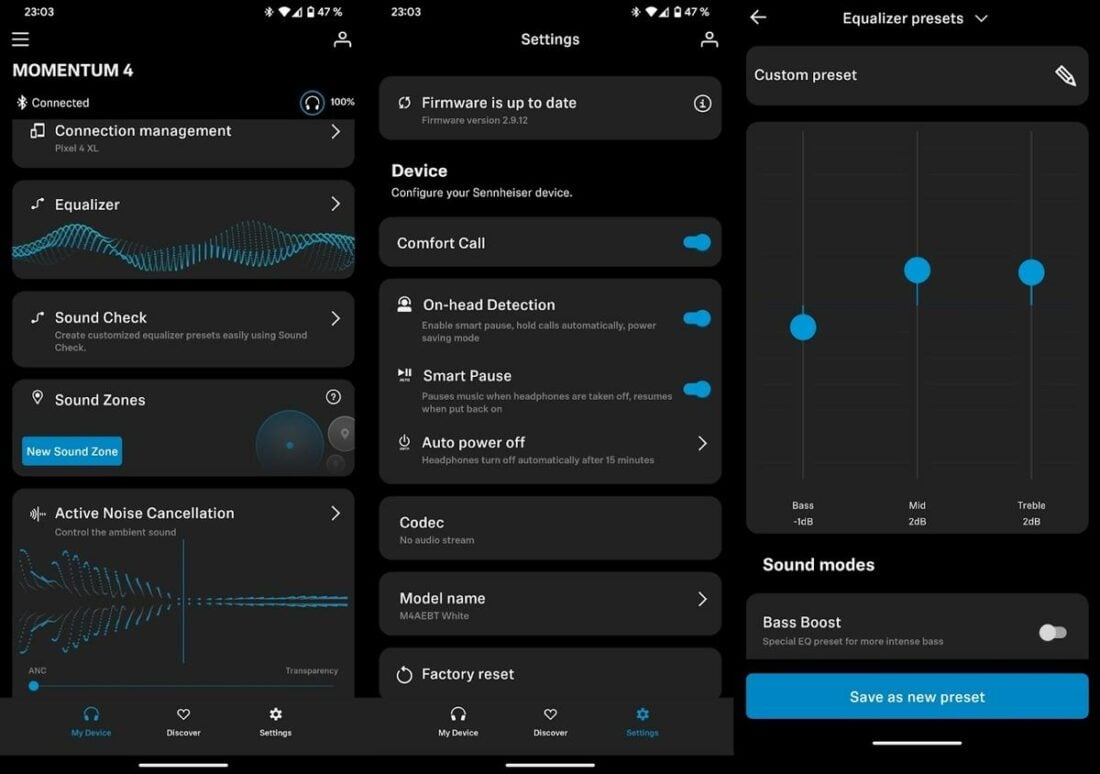
Comparisons
Sennheiser Momentum 4 Wireless Vs. Sony WH-1000XM5
Sony’s WH-1000XM5 are class leaders in terms of ANC performance. The Momentum 4 Wireless fall behind slightly, as human voices are better filtered out on the Sony headphones.
The build is similar, but I like the fabric headband on the Momentum 4 Wireless more.
As for the sound, in stock form, the WH-1000XM5 sound bassier and smoother. You can easily control the amount of bass via the app and make them sound cleaner and clearer. However, the bass quality is better than the Momentum 4 Wireless.
The Sonys have wider and deeper staging and superior imaging. Dynamics are similar between both.
The Sony headphones have better EQ and DSP support. On the other hand, battery life is far superior on the Momentum 4 Wireless.
Another consideration is the price gap. While the MSRP is similar, the Momentum 4 Wireless are often on sale and can be had for a significantly reduced price.
The Momentum 4 Wireless have better battery life, while the Sony WH-1000XM5 are better in all other aspects.

Conclusion
Sennheiser tries to follow the competition with the Momentum 4 Wireless rather than going down its own route. The result is pair of fairly generic Bluetooth headphones that blend in with the crowd but offer a competitive feature set.
Sadly, the most important aspect of any headphones, the sound, remains an afterthought. The honky mids, somewhat muddy bass, and peaky treble do not provide the sound that the Momentum 4 Wireless need to stand out.
So, the Momentum 4 Wireless will fly under the radar. I can only recommend them if, for you, their features outweigh their sound, and you get a pair for a significant discount during sales.
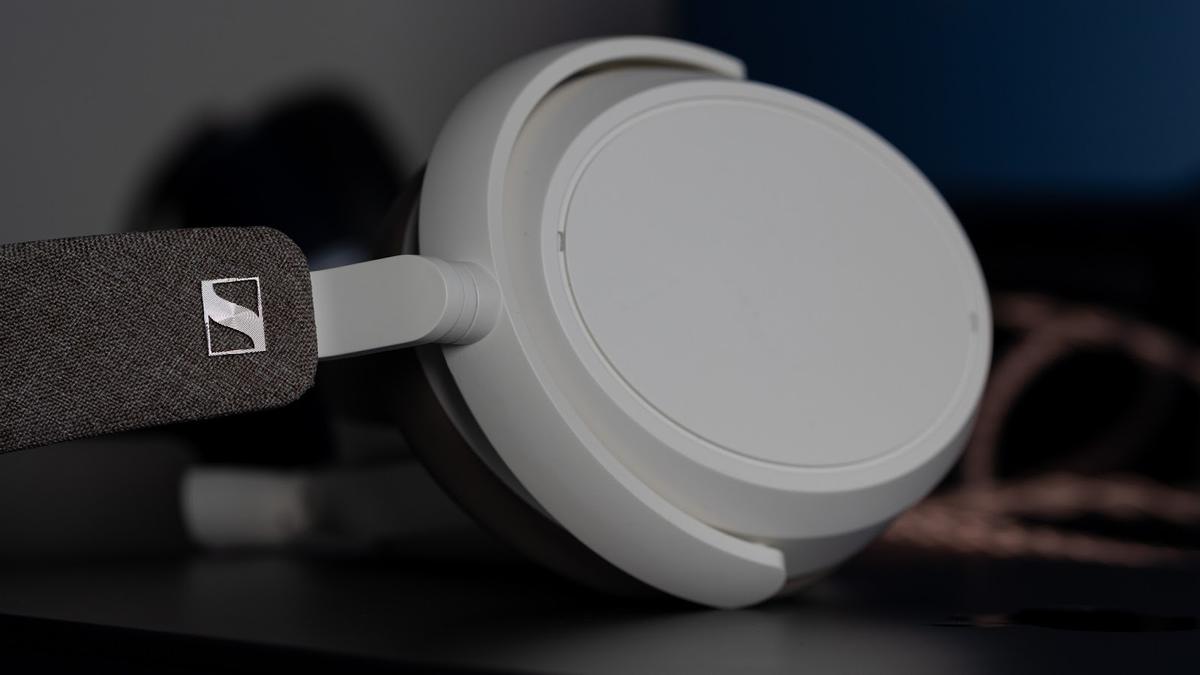
Sure it offers ANC off? That would be fairly new than via a software update because people were missing this feature so far. What I know of being there is the adaptive ANC toggle, but not completely switching of ANC.
Placing the slider in the middle essentially turns ANC off from what I can gather.
Please… Another review that puts Sony on a pedestal… Ok, anc is undeniably good in it, but the sound quality? I don’t remember, but Sony has a function that artificially improves imaging. More and more people are appreciating the sound quality of the Momentum 4 after adjusting it in eq based on measurements. The latest Sony already has transducers with a diameter of 30 mm … The previous ones were probably 40 mm … Well, but Sony is so great, what would they do … 😀
The Sony only have exceptional ANC. The Momentum 4 on the other hand sound incredible: transparent, airy, detailed with great layering and separation. The Sony have good sound only for pop, acoustic instruments sound unnatural. They’re good for listening to music on youtube or from a low-quality MP3s (192 kbps or less). It’s ridicilous to even compare them with the Momentum 4, which can compete with the best wired headphones under $250 easily.
I listen to Tidal, not YouTube, during reviews. And the Momentum 4 do not even support LDAC so I am not sure why you think they are more suited to high-res playback.
Regarding sound, Sony has a much better EQ implementation that is far more flexible than the ridiculously limited 3-band (!) EQ of the Momentum 4.
I have nothing against Sennheiser. Just a day ago I reviewed their IE 200 and awarded it one of the highest ratings that I am usually reluctant to give out. The Momentum 4, to my ears, are inferior to the Sonys, and the reasons have been explained thoroughly in the review.
I’m very curious. I currently have the Sony XM-5s paired with a Samsung A71 and I stream Amazon HD music with LDAC codec.
I keep hearing how superior the Sennheiser Momentum 4s in sound quality (other than this review).
With the Momentum 4s only offering me regular Aptx due to my phone, I would think the sound would be a downgrade to my LDAC streaming Sonys? Any thoughts appreciated!
Either your Momentum 4 is broken (unlikely) or you have completely different sound preference to majority of people who have compared the Momentum 4 with the XM5.
This review is definitely subjective. These headphones are truly amazing, you probably have a broken set or they just do not suit you. They are definitely bang for your buck at this price range without a doubt!
Weird. Imo, this headphone is exceptional re. soundquality and inline with Sennheisers ‘signature’. Your findings re. muddy bass, honkey mids and peaky trebble are remarkable and lightyears apart from how I (and apparently many others) experience the sound. I would advice people to listen for themself.
Your review makes no sense whatsoever. These highly acclaimed headphones were awarded Best Buy in the Netherlands. I own a pair and the sound they produce are outstanding. Like others have said; either yours were faulty or you need your ears checked out.
What country are the headphones made in?
Made in China.
Your review makes no sense. These phones have won awards in many countries as best buy. Try better next time.